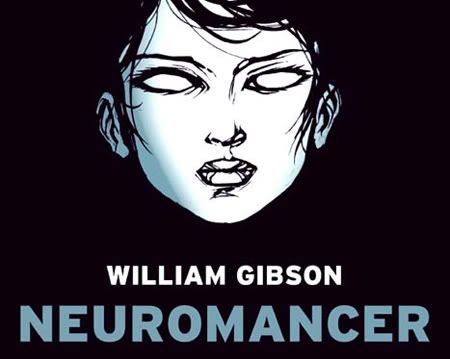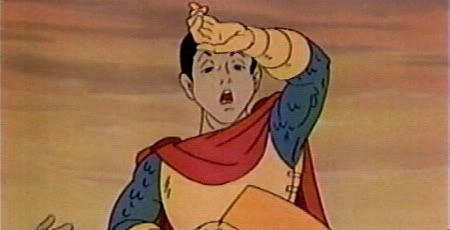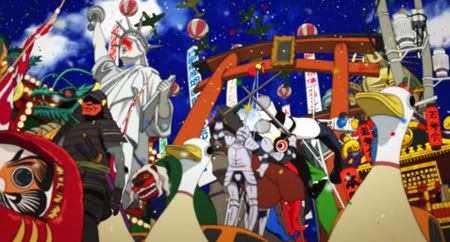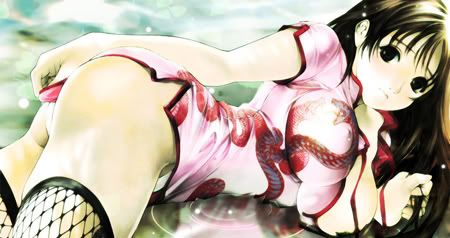Distancing itself from other texts like 1984 or The Handmaid’s Tale, Neuromancer is in comparison, the least dystopic view of the future, or at least, it seems to be. Just as a dystopia ruled by drug abuse appeals to the drug addict, a dystopia centered on laziness appeals to the lazy, and a dystopia ruled by technology ultimately appeals to those with an interest in technology. In that sense, Neuromancer, and cyberpunk in general, reaches out to the readers of today, and the text dangles in front of the reader a vision of the future that may be fueled by violence and dehumanization, but the allure of the technology still persists. That is where Neuromancer strikes a strong chord in modern society, because the allure of technology is growing considerably more prevalent each generation. Gibson seems to ask the question, “What would you give up to have what I’m offering you in this future?”
Obviously, the question isn’t so easily answered for us, but for Case and Molly, the choice has already been decided. It’s interesting that while they were curious about the nature of their assignment, they never chose to abandon it, even after they realized the ultimate goal of Wintermute. Case never asks what the outcome of freeing an artificial intelligence could be. Case could only be Case, and do as was expected of him. The same could be said for Molly. The two are almost symbols for the direction all of society took in Gibson’s future. One side of life embracing the low, gritty violence of the streets, and the other withdrawing into cyberspace, to explore a different world, one without the nuisance of, as Case would say, the flesh. It could be suggested that the entire novel is centered on exploring two characters, each an opposite side of the “fight or flight” mechanism.
Apart from technology itself, many of the dystopian elements of Neuromancer are only alluded to. This is a world ran by corporations, but Gibson never fleshes out how terrible this idea could be; he saved that vision for the story of Molly’s past lover Johnny. Johnny Mnemonic is that character, and in the film of the same name, the true horror of a society ruled by corporations is the direct focus. That is, it would be the focus, if the film was actually good. It isn’t. This is also a world in which technology has made for terrorism to be an even simpler task than it now is, and even this, although at the time of writing Gibson probably wasn’t nearly as focused on the act of terrorism as we are now, is only briefly mentioned in the context of the larger events occurring between Case, Molly, Armitage, and Wintermute.
The novel itself never explains clearly what the outcome of Wintermute’s merging with Neuromancer is. We only know that Wintermute was destined to seek Neuromancer, and Neuromancer, not needing any personality because of its structure, was destined to avoid this fusion. Although, destined probably isn’t correct term, the two intelligences were programmed, not destined, to follow their respective paths. What is the result of having a free, sentient artificial intelligence roaming cyberspace? Gibson never answers the question, and he never suggests that there is anything particularly threatening resulting from it. Even now, considering society’s progress towards Gibson’s future, this issue is the most difficult and curious one presented throughout the whole of the text. Are we prepared to live in a society in which a machine can exist in a more powerful position than any human being? A machine that is aware it is a machine, that still has no true emotions and no concept of feeling outside the program it was created to follow. Perhaps Nueromancer is quite the dystopian novel after all.
Labels: Books, Coursework, Cyberpunk, Dystopia, Fiction, Literature, Neuromancer, Reviews, William Gibson
While the focus of The Handmaid’s Tale is primarily on the subjugation of women, just as much attention could have been placed on how fearful the idea of reverting to early Christian ideals is in all cases. The society that brought forth the Republic of Gilead seems to have progressed slightly more liberally than our own, or perhaps Atwood is only focusing on the most negative aspects of our own society, but for a world even similar to our own to allow itself to embrace nothing more than tradition and religious precedent; that is a frightening premise.
Interestingly enough, Atwood proves through the actions of nearly every character in the book that although The Republic of Gilead has proven itself a strong enough force to capture a large portion of America, it has failed in capturing the hearts and minds of its people, and is most probably doomed because of this. The fact that the novel is taking place in early Giladean history could prove that the nation still has a chance to establish itself further, but in reality, the characters’ passion for the world they left behind is too persistent and alluring for them. The Commander himself never mentions as he tours Offred through Jezebel’s that this “necessary evil” is something to be left behind over time. He still yearns for socialization with women and the many other fragments of pre-Giladean society that were lost. Serena Joy is just as troubled with this new society, although her own religious preaching could have been a propellant of Gilead; ultimately, she is left without that outlet in the new society, and is something of an empty shell.
A realistic analogy for the state of The Republic of Gilead and its people would ask: If you were to throw a stone down a chasm with a rope attached, you could always pull it back up, but if the stone fell too far, would you still be able to, or is the stone too heavy, and has it traveled too far? Could a society similar to our own actually revert to tradition and early Christian ideals or would attempting to do so prove that they’ve come too far (through good or bad progress) to ever really allow that of themselves?
The appendix seems to justify that Gilead does indeed fall, but to what extent, and at what cost? Apart from naming The Republic of Texas, the world is left open for interpretation. Atwood could have been leaving something optimistic for the reader, going against so many other dystopian novels, but at the same time she chooses carefully to include some chauvinistic attitude in the speaker, and never truly focuses on the atrocity of Gilead, just the occasional fact. Is post-Giladean society dehumanized, or is it back to what it once was? Which is better, and which is worse?
If society has returned to the state it was before Gilead, have all the negative aspects of society returned as well? It’s interesting to propose that while the feminist movement was undoubtedly positive, demanding so much freedom could have been the lone catalyst that propelled Gilead into being. The feminist movement, in some small way, is responsible for much of the open sexuality and lack of “traditional values” that inspired the men in The Handmaid’s Tale to rebel. Women like Serena Joy, scared of the waning morals in modern society, were content with letting, and even helping, the change to take place. Of course, our society doesn’t parallel this exactly, and while we have obvious similarities, it would be difficult work to prove that the feminist movement did even close to as much harm as it did good.
Labels: Books, Coursework, Dystopia, Fiction, Literature, Margaret Atwood, Reviews, The Handmaid's Tale
At some point in reading Utopia, it becomes evident that Thomas More isn’t necessarily describing the ideal society, the definition for which we have given utopia, but his own version of that society. That’s not to say anyone who attempted the task would be able to deliver anything more than that, but More succeeds in coming closer than those with less wit, and less idealism otherwise might. His description of Utopia, and the Utopians, proves that he has taken the task of building a perfect society very seriously, and perhaps at the time of his writing, most could have agreed that the world described by Raphael Hytholoday is a near-perfect vision of a commonwealth.
Unfortunately, with the knowledge that hindsight allows, it becomes mostly evident that More’s ideal society, while noble, is still rooted particularly in the customs and times from which the text originates. Could the society of Utopia still prosper in a modern and technological world? More’s definition of utopia might, if reevaluated today, mention that there is no need for the technology that we now have; and that it only stands in our way from reaching the state of a perfect society. However, that stands in direct opposition to the course that More gave the Utopians by embracing the idea of the printing press so openly. More opened the door for the Utopians to accept technology, and while our technology today might often contribute to a less than noble society, it has become something that in our own, modern vision of a utopia, we couldn’t live without.
Interestingly enough, while much of our society is in direct opposition with the Utopians, that doesn’t necessarily mean we aren’t similar. At the time of writing, More predicted many things that actually came to pass years from his original writing, such as women being able to marry at the age of 18, or the idea that Utopia was a nation that allowed it’s citizens to embrace any religion they chose. These ideals, while More may have borrowed what he felt were the best ones from ancient civilizations, often weren’t popular until hundreds of years later.
The age of More’s Utopia also shows in the occasional brutalities and direct courses of action for many crimes and punishments. For the simplest transgressions citizens are reduced to prisoners, and the consistent notion that acting against the society will cause them to be looked down upon, or disrespected, makes for a society that is obviously oppressive to those harboring any ideas of change. Utopia even makes use of the death penalty for numerous offenses, some less deserving than what we allow today. Could we look at a society in modern times and view that as ideal?
Religion in More’s work is actually one of the more forward-thinking aspects in Utopia, but there is one section in the text that seemed unnecessary. My original belief that Christianity wouldn’t have been accepted in Utopia was obviously incorrect, but in review, it was my own view of Christianity that was shaping my opinion. Where I see Christianity as believing Jesus is the son of God, the Utopians have accepted what seemed to be the view that Jesus and God are one in the same, which is a fairly popular perception. This isn’t so far outside the idea that Utopians believe men are all born equal, but it did still feel forced into the reading. More’s own religious views might have been overshadowing the impartiality he gave to the character Hytholoday. Even later in the writing More’s description of the most holy priests in Utopia also seems awkward in relation to the other descriptions of Utopian society. Why, when princes and all other men were viewed as equals, were these priests so unique in being revered and respected?
Ultimately, More might have failed in creating a society that is perfect and would forever continue to be. Whether that is based on his own faults in opinion, the limited vision he could have coming from his time, or the basic belief that we as people can’t be jammed into an “ideal” society; is difficult to say. It is obvious though; that the fictionalized society of Utopia is a vision that is easily one of the most noble, and complex works ever created with the hope of making a nation a better place for all of its citizens.
Labels: Books, Coursework, Dystopia, Fiction, Literature, Reviews, Thomas More, Utopia
Within 1984 George Orwell delivers what is essentially the most popular vision of dystopia ever written. The texts popularity is most commonly based on how Orwellian our society has become, or how 1984 has become more prophecy than fiction. Unfortunately, while the similarities behind Oceania and modern society are understandable, they aren’t the reason this novel should have such staying power. The true impact in 1984 is how completely and brilliantly Orwell envisioned dystopia.
Oceania is a society without flaws, without hope, and without end. The character Winston, until his ultimate acceptance of the party, portrays us. Humanity, for the most part, as it now exists. He is able to think freely, to rationalize, and to discover the world for himself. He may have to fight a battle against some very strong opposing forces to do so, but it is still an opportunity available to him. 1984 is the story of the final destruction of man as we are now, through Winston. Even O’Brien makes note to tell Winston he is, “the last man.” Men are extinguished in 1984, and only party members exist from the time after their extinction.
It could be realistic to ask, “What about the proles?” Winston asked himself the same question. Are they not still proof of humanities persistence? That was answered within the novel as well, “The proles are animals.” Through this answer each mention of the proles and their imaginary revolution is quenched as quickly as it is brought forward, and it is disturbingly correct. The proles are animals, even in an almost literal sense. They exist as the meat of the party, the cannon-fodder for wars and territory, and they could most properly be considered sheep. Their intellect has been forced downward by the party, the most intellectual eradicated, and their only real outlets include simple roles and the lottery. If there is a prophetic vision in 1984 to modern society, this is the most potent. Are we not often envisioned as sheep as well? We could be as much slaves to the forces in our lives as proles. Luckily, the integrity and intelligence of our society, while it is always in question (as it should be), is still a far cry from 1984, and I think most would suffer a revolution before we accepted a similar situation.
If there is any true threat proposed to us in 1984, it is the idea presented in altering reality. Although not quite as literally as when O’Brien claims he could float from the floor, as my ethnocentrism refuses me the ability to believe my mind could accept that, the idea of changing reality through the manipulation of history, language, and attitude is the strongest and most fearful aspect of the party. Oceania succeeded in removing thoughts from the brains of party members, and they did it not only through unspoken laws and the fear tactics of a repressive state apparatus, but also through what could be described as the destruction of academics. Removing thoughts is as easy as removing the knowledge that is their source. No one in Oceania is learned in anything other than their field of work, and even then they are barely adequate. Why should a society have 10 intellectual workers, when 100 average workers are capable of the same effort, and with less risk? Limiting the knowledge of an entire population is the most threatening aspect of 1984. The idea that this could be happening now without our knowledge is nothing short of scary, and the truth that no revolution could combat this or none would ever even be able to occur is even terrifying.
I suppose that in that context many could be correct in assuming 1984’s staying power is in how Orwellian our society has become. I can’t see it from that perspective, partly because I can’t take the bad without the good. Our society has adopted some patterns undeniably similar to the party, but we still retain the ability to question and fight against those policies. We are, unlike Wilson, still men, with at least some sense of freedom. Even if it is only the freedom to debate how much freedom we have, we still possess it. I could never accept Orwell’s book as prophecy or even an envisioning of what our society is headed towards, but I’d rather view it as a guide. Just as More’s Utopia was a guidebook in achieving what could be a perfect state, Orwell’s 1984 is also a guide. It is the guide to how totalitarian society could become if we don’t maintain a watchful eye on those in power, the knowledge of the populace, and the truth that could be avoiding us.
Labels: 1984, Big Brother, Books, Coursework, Dystopia, Fiction, George Orwell, Literature, Orwell, Reviews
I apologize. No lengthy explanation. All should be apparent. I'll make amends soon; I promise. Until then, know that I have been doing something at least:
Sudokuro Preview - Nintendo DS - Modojo
Where games like Sudoku Gridmaster seemed to pale in comparison to the add-on Sudoku in Brain Age, Sudokuro is at least launching with some hindsight, and hopefully will be presenting a fully featured puzzler's heaven of mathematical content. If not, then Brain Age is always hanging back somewhere in the catalog of a serious portion of DS owners, and Toondoku is still looming right beside Sudokuro on the horizon. The competition is stiff, but if nothing else, this one's got a budget pricetag of $19.99, and of course, the freaking dragons.
Death Jr. and the Science Fair of Doom Preview - Nintendo DS - Modojo
A couple years later and hindsight offers us the chance to look back upon the release of Death Jr. with the knowledge that despite the games unique storyline and interesting setting, gameplay mechanics and camera issues doomed what was a potentially brilliant IP into mediocrity. Even the sequel to the game never quite proved itself as the savior of handheld 3D platforming, and that is where Death Jr. seemed to be heading, down the road of being another platforming attempt that just failed to capture audiences like the big hitters, namely Mario and even the PSP's own Daxter. However, Backbone refused to allow Death Jr. to slip softly into the night, and thanks in part to the success of Nintendo's handheld machine, they've decided to give Death Jr. a shot on a device that is a little more geared to the audience they were initially reaching towards.
Valhalla Knights Preview - Sony PSP - Modojo
The vastness of the fantasy wold in Valhalla Knights is second only to the vastness of character customization within the game. Every single wearable item in the game doesn't only affect the character and his abilities, but they are all also viewable on the character model. As far down as rings and necklaces, everything can be seen. That is a truly impressive achievement for any game, on any platform, and it will surely inspire players to explore the appearance of their character.
Puzzle Quest Roundtable - Nintendo DS/Sony PSP - Modojo
I definitely noticed more RPG than I was expecting. Actually, it felt a lot like Heroes of Might and Magic. More than a lot, a TON like Heroes of Might and Magic. I'd have to imagine that was the mold they were facing when they chose to go down this design path. Of course, they removed the battle elements and replaced them with puzzly ones, which is why the game is so damn unique.
I noticed how ridiculously robust the game was when I was building my town up and using the structures (stables, mage tower, etc.) to gain abilities. Starting there, and moving onward, I just kept saying, "Jesus, this is in here too?"
Lost in Blue 2 Review - Nintendo DS - Modojo
There could be, in some way, a niche market that finds the grueling experience that is Lost in Blue 2 enjoyable. Diehard survivalists or the kind-of too old Boy Scouts with a seriously concerning collection of Merit Badges could be right at home with this game. Or maybe not, there's always that girl/relationship element in there, and I hear these guys are scared of those strange girls. Their strange smells and strange breast things tend to freak them out and make them lose their focus on the kindling and rabbit traps. Yeah, I lose focus too guys, nothing to worry about.
Hit the links for the whole written ordeal, not just an excerpt. Now imagine that I've also been doing tons of schoolwork, handling Modojo's scheduling, editing and uploading of reviews and previews, and working four days a week at Barnes & Noble. AND taking the time to (get ready for this one) exercise almost every day.
I'm owning the 24 hours in a day.
Labels: Death Jr., Lost in Blue 2, Modojo, Nintendo DS, Previews, Reviews, Sony PSP, Sudokuro, Valhalla Knights
I can't focus on a damn thing tonight, so I'm going to wander fairly aimlessly in words and pictures. Let's see if it is entertaining at all.
Naruto 360 looks beautiful, and when full size screens and footage do drop on IGN, 1UP, and the like (which should be soon), I imagine they will inspire a collective dropping of the jaws. The potential of cel shading on next generation consoles is looking to be a really interesting development. Here's hoping that Naruto 360 doesn't fall into the same traps of being a terrible anime game.
Yeah, so the opening city of Paprika has been announced, and I chose the wording of that sentence carefully. A single opening screen? And another in the following month? I wouldn't hold out much hope for seeing this one as it should be seen. In short: Fuck you Sony Pictures Classics. Fuck you all over the place. I'd rather companies not even bring good movies to the theaters if they're going to do it in a manner that even people willing to travel to the nearest city still can't see the movie.
I'd owned the first seven DVD's in the Tenjho Tenge series for a long time. I had never seen more than the first, instead waiting for the moment I could watch the series in full. Finally I bought the eighth and final disc, which is insane enough that a 26 episode series was on 8 discs, and sure enough, I crammed the entire series. Was it all worth it? No fucking way. Eight discs, tons of anticipation, and oodles of dollars later, I find out that the series comes to close in a non-ending? It's as if my balls were crushed under the mighty force of the oligarchy. One thing it does have going for it? The boobs.
I've just finished reading Kuhaku and it is one of the most delightful things I've ever read. Once again, I'm carefully choosing my words and not saying that this is great or epic; it's merely delightful. The novel is a collection of 16 stories/essays/accounts from those living in Japan. Some are from the view of foreigners, some from Japanese, and some from expatriates who will probably never leave their new home. Overall, the novel is a great insight to the varying worlds of the land I hope to migrate to in time. Not to mention, the cloth cover, color and b&w illustrations, and even an included bookmark make this one of the nicest looking books I own. Check out the website of the publisher, Chin Music Press, for more information on the book. Take the time to read the blurbs and I think you'll see that this is something everyone with an interest in Japan should own.
I could probably keep going, but I'd rather just finish with this ... it is the best game commercial I've ever seen. +1 Million experience points to anyone that knows which bit is from Conan the Fucking Barbarian (or Destroyer, I can't quite remember). Praise Cromm.
Yes ... the lamentations of their women.
Labels: Anime, Chin Music Press, Japan, Kuhaku, Naruto, Naruto 360, Random, Video, Video Games, Viva Pinata



